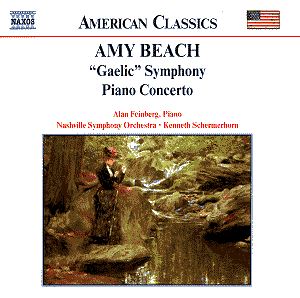Another exemplary disc in the Naxos American
Classics series brings together the two works which are arguably
Amy Beach's finest achievements, at least in a large scale format.
The performances are as idiomatic as we have come to expect from
Schermerhorn's Nashville recordings (the Ives and Hanson discs
were superb!) and Alan Feinberg is a celebrated stalwart of the
American piano repertoire, including some wonderful Ives. His
contribution to the Andrew Imbrie CD on Bridge is very fine and
that same label, rather than Neeme Järvi on Chandos, provided
my first exposure to Beach's highly affecting symphony. Much as
I still enjoy that performance, cuts and all, and its William
Grant Still coupling, this new Naxos disc has now to be a top
recommendation, especially at budget price.
The four movement
symphony was written almost in reaction to Dvořák's suggestion,
as was later definitely seen in the music of the aforementioned
Still, that American classical music ought to draw on "African
and Native American" themes. Beach argued, and here put into practice,
that it was equally acceptable and appropriate to use the musical
material of Americans' ancestral countries, in this case Ireland,
to invigorate and, I suppose, validate the new "tradition". Whatever
your thoughts on this philosophy, you cannot fail to be impressed
by the music to which it gave rise. The Gaelic, while it
is clearly rooted in the prevailing late-Romantic musical landscape,
makes apt and truly memorable use of several Irish folk tunes,
from jigs to laments. The slow movement, marked Lento con molto
espressione, is a particularly affecting musical embodiment
of "the laments, romance and dreams of the Irish people". This
music is, unsurprisingly, closer to Stanford and Harty than to
Copland and Bernstein. It still represented a major step forward
in the development of a separate, truly American musical identity,
going far beyond the strict adherence to Germanic models practised
by, say, Parker, who initially taught Charles Ives. Anyway, I
urge you strongly to make this symphony's acquaintance as only
the most died in the wool ultra-modernist could possibly fail
to respond, by turns, to both its charms and emotional depth.
The piano concerto is a slightly later work but
still composed on the cusp of the 19th and 20th
centuries. Like the symphony, it also makes use of themes from
some of Beach's celebrated art songs. The opening Allegro
is almost as long as the other three movements put together but,
again, it is the keening, lyrical slow movement that has the greatest
impact. Pianistic virtuosity abounds but there is much more to
Amy Beach as a composer, both here and elsewhere. It is very gratifying
to see her music being championed so successfully. Like Rebecca
Clarke, who has also recently undergone a critical and recording
renaissance, Beach is a landmark female composer who deserves
the widest possible hearing for her accessible and beautifully
crafted music.
Neil Horner
